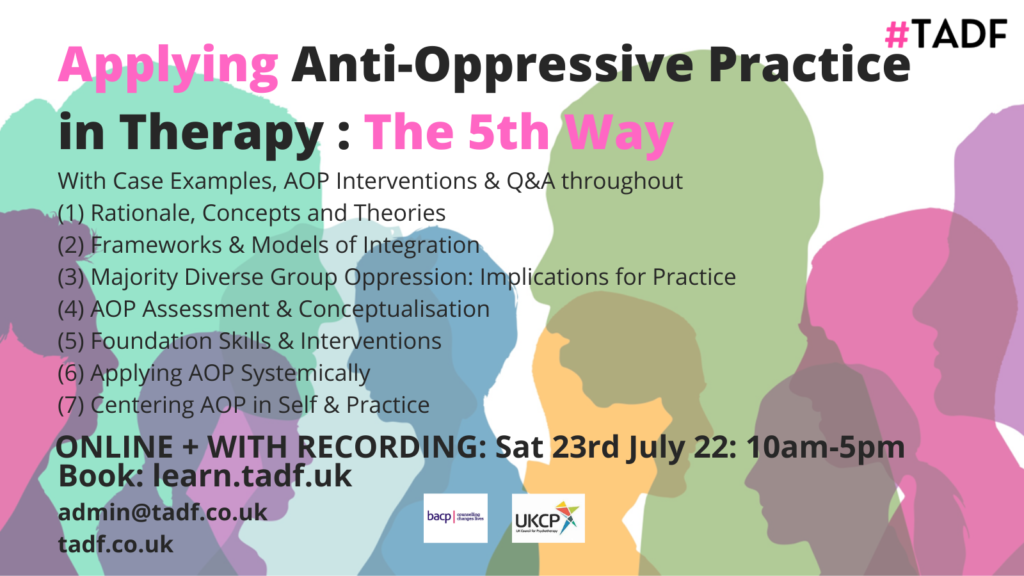Applying Anti-Oppressive Practice in Therapy: The 5th Way
Book ticketsOrganised by:
#TADF

Description
Join anti-oppression facilitators Mamood Ahmad (UKCP Psychotherapist) and Sam Jamal (BACP Therapist) as they help you integrate anti-oppressive principles within your therapeutic practice. This training will equip you with foundational knowledge and practical skills in building a more just, inclusive, and ever-improving psychological practice, whether working with clients and their experiences of oppression, marginalisation, and exclusion, within the therapeutic practice of one, or within a mental health organisation.
Background
Anti-oppressive practice (AOP) is a framework for psychotherapy, counselling and psychological practice that stresses the relevance of recognising the psychological impact of power, privilege, and oppression. This relates both to within clients’ lives and to its dynamic within psychological services, the therapeutic space, and organisations that offer associated services.
Anti-oppressive practice is not limited to a single issue or population. Rather, it is more broadly linked to challenging oppressive power structures that reflect, produce, and sustain injustices such as racism, sexism, heterosexism, cisgenderism, classism, ethnocentrism, ableism, ageism, xenophobia, and other intersecting forms of structural oppression.
In psychological training, the therapist can often be left without the knowledge and skills necessary for them to begin integrating and working within an anti-oppressive frame. The link between the client’s social location, discrimination, and difficulties may never be made. This can leave an important factor out of therapy and consequently lead to a shortfall in the service provided or, worse, negative or even harmful experiences. Thus, it is essential we create a therapeutic service that is safer, more inclusive, more complete, and more skilful.
Overview
The training is structured into seven units with discussions, case examples, and practical anti-oppressive interventions and strategies provided throughout. There will be opportunities to ask questions, bring in your own experiences of anti-oppressive practice, and gain insight from therapists with experience of integrating AOP within therapy and various helping professions.
1: Rationale, Concepts, and Theories
2: Principles & Models of Therapeutic Integration
3: Majority Diverse Group* (MDG) Oppressions (A-Z): Implications for Integrated Therapeutic Practice
4: Assessment and Conceptualisation
5: Foundation Skills & Interventions: Exploring Narratives, Therapeutic Interventions, Safety, Advocacy, and Empowerment
6: Applying AOP Systemically: A Simulation of Inadvertent Systemic Discrimination and Its Impact on Client Experiences and Outcomes
7: Centering AOP in self and practice
Audience
This training is for anyone involved in the mental health profession. From psychological practitioners, such as counsellors, psychotherapists, and psychologists, through to all organisation staff who are involved in governing or delivering therapeutic services such as training organisations and membership bodies. It is also suitable for trainee therapeutic practitioners.
Learning Outcomes
By the end of this course, you will:
• Be able to understand and explain anti-oppressive concepts and theories.
• Understand the importance of applying anti-oppressive practice values and principles in ameliorating suffering and in providing an equitable therapeutic service.
• Be able to understand and explain the mental and physical impact of oppression, marginalisation, stress, and discrimination on intersecting majority diverse groups.
• Build a deeper understanding of challenges that various intersecting majority diverse groups face and, thus, implications for therapeutic practice and in mental health provision.
• Learn how harm in therapy can be systemically, culturally, and individually mediated.
• Be better equipped to assess and conceptualise experiences of discrimination and oppression as part of a client’s overall problem presentation.
• Learn anti-oppressive ideas, skills and interventions to help build the relationship and help clients narrative relevant aspects of their contextual experiences of marginalisation and discrimination associated with their intersecting social identities.
• Learn common mistakes therapists make in developing the majority diverse relationship which forms (often invisible) barriers to the relationship and impacts outcomes.
• Be better prepared to help clients manage potentially unsafe environments, client autonomous empowerment, allyship, and anti-discrimination strategies within the room as well as within service provision.
• Be able to understand and practically apply concepts and theories of anti-oppressive practice at a systemic level, whether a practice of “one” or within an organisational setting.
• Be able to situate your learning and reflect on your own personal worldview and call to action.
What’s included
– Access to a live Zoom event
– Access to a replay of the event (30 days), with extensions on request
– Online access to slides
– Aftercare
Aftercare
We have specific protocols to keep the environment as safe as possible for all and particularly for people with lived experience of minorized stress and trauma. The instructors will be available between breaks and after the training for up to 30 minutes to support you.
About #TADF
#TADF is a network of psychological practitioners who work with individuals, institutions, and training providers to embed anti-discrimination practice into their curriculum, service design, training, and organisation.
* Majority Diverse Group. That is, protected characteristics as well as class, socioeconomic status, and neurodivergence. We affirm trans/non-binary gender inclusive rights and identities.
